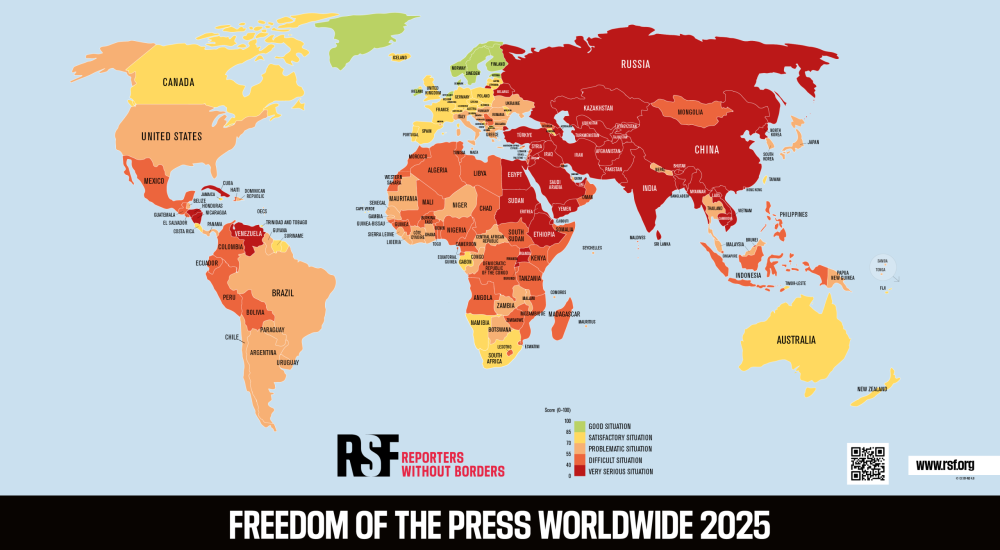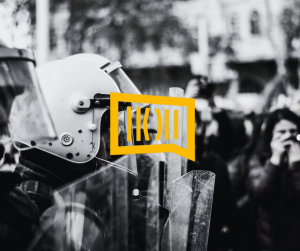Press freedom has continued a downward slide in most Balkan countries according to the latest report by Reporters Without Borders – although Albania, Montenegro and Serbia have bucked the trend.
The majority of Balkan countries, including Kosovo, Bulgaria, Croatia, North Macedonia, Romania, Bosnia and Herzegovina and Moldova, have dropped in the latest press freedom rankings compiled by the media watchdog Reporters Without Borders, RSF.
The 2025 World Press Freedom Index, published on Friday, underscores increased economic pressure on independent media around the world and a wave of media shutdowns. As a result, the latest ranking classifies the global state of press freedom as a “difficult situation”, a first in the history of the Index.
In Europe and Central Asia, the index warns of a “slow economic asphyxiation of the independent press”.
In the Balkans, only Albania, Montenegro and Serbia saw their rankings improve, despite significant problems hampering their media freedom in these countries.
Kosovo sees biggest fall
Kosovo saw the sharpest decline in the Balkans, falling 24 places compared to last year’s score. This year it was ranked in 99th place compared to the 75th place in 2024.
“While the Kosovo media market is diverse, its development is limited by its small size and ethnic divisions. Media freedom is threatened by politicised regulation, gag suits, insufficient access to public information and serious risks for the safety of journalists,” RSF said.
It added that journalists in Kosovo are a constant target of political attacks, and it criticised the adoption of the Law on the Independent Media Commission, which it said allows politics to influence this body.
In its response, the Association of Journalists of Kosovo, AJK, said it was “alarmed by the new, drastic decline”.
“AJK is deeply concerned with this ranking, the lowest in a decade. However, AJK sees this as a reflection of a continuous active hostile policy towards media in last two years by the government led by Vetevendosje,” AJK said.
Croatia, an EU member state, dropped 12 places, from 48th position in 2024 to 60th place this year. So-called SLAPP lawsuits against journalists there pose a big hurdle, the report said.
“While the media landscape is diverse and dynamic, the government has failed to protect journalists against strategic lawsuits against public participation (SLAPPs) and attacks by organised crime, and has exerted pressure on the media,” it wrote.
Bulgaria, another EU member country, dropped 11 places from 59th position in 2024 to 70th this year.
“Press freedom is fragile and unstable in one of the poorest and most corrupt countries in the European Union,” RSF wrote, adding that “the few independent media in Bulgaria are under pressure”.
North Macedonia fell six places in the 2025 rankings, from 36th place last year to 42nd.
RSF noted that, “although journalists do not work in a hostile environment, widespread disinformation and a lack of professionalism contribute to the decline of society’s trust in the media, which exposes independent outlets to threats and attacks”.
It added: “Government officials tend to have poor and demeaning attitudes towards journalists.”
Bosnia and Herzegovina ranked in 81st place out of 180 countries last year. This year, it fell to 86th place. Problems were worst in Republika Srpska, the country’s Serb-majority entity.
“Press freedom and the quality of journalism vary widely across the country,” the report noted, adding that public-interest journalism in Republika Srpska “is challenged by the recriminalisation of defamation and the rising influence of Russian propaganda”.
Romania dropped six places, from 49th place in 2024 to 55th in the new ranking.
The index notes that while Romania’s media landscape is diverse and relatively pluralistic, providing fertile ground for hard-hitting public interest investigations, it lacks “transparency surrounding media financing – especially concerning political parties’ public funds”, while market difficulties undermine the reliability of information and trust in the media.
Moldova fell four places from 31st last year to 35th in the 2025 index.
The index noted that its media remain deeply polarised between pro-Russian and pro-Western camps.
As a positive, it added that: “The control oligarchs and political leaders exerted over editorial positions has decreased compared to previous years.”
Hungary, Greece and Turkey go from bad to worse
These three states fell only slightly in the rankings. But their previous rankings were already poor.
Hungary, where RSF describes Prime Minister Viktor Orban as a “predator of press freedom” dropped one point from 67th place to 68th.
“Orban has built a true media empire subject to his party’s orders. While independent media outlets hold significant market positions, they are subject to political, economic, and regulatory pressures,” RSF said.
Greece also dropped one place, from 88th to 89th place. There, RSF noted that press freedom has suffered a systemic crisis since 2021.
“The scandal of the wiretapping of journalists by the National Intelligence Service (EYP) has yet to be cleared up, as is the case regarding the murder of veteran crime reporter Giorgos Karaivaz in 2021,” the index said, adding that “SLAPP procedures are common”.
Turkey remains at the bottom of the list of Balkan countries and near the bottom globally. This year it fell from 148th to 159th spot and the report noted: “All possible means are used to undermine critics.”
“With authoritarianism gaining ground”, the report added, “media pluralism is being called into question.”
Albania, Montenegro, Serbia go up a notch
Montenegro saw a slight rise in press freedom, from 40th position last year to 37th this year,
But while its constitution and laws guarantee freedom of speech and expression, the index noted that “press freedom continues to be threatened by political interference, unsolved attacks on journalists, and economic pressure”.
Serbia, despite prolonged social unrest and political upheaval, also rose in the rankings, from 98th place last year to 96th position in the new ranking.
Although there is high-quality journalism in Serbia, especially concerning crime and corruption, “it is caught between rampant fake news and propaganda”, the index wrote.
“Despite a solid legal framework, journalists are subjected to political pressures and crimes committed against them go unpunished,” it added.
Albania made the biggest jump this year, from 99th place in 2014 to 80th this year. But concerns remain.
“In Albania, press freedom and media independence are threatened by conflicts of interest between the business and political worlds, a flawed legal framework and partisan regulation,” the index noted.
It added that journalists there remain victims of acts of intimidation by politicians and organised crime.
Source: BalkanInsight




